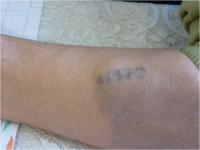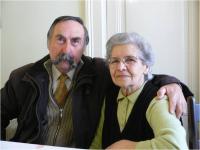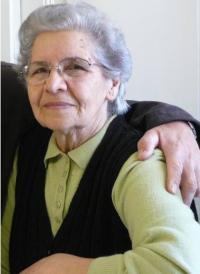„When we were passing through Trieste we were singing....We couldn‘t care less.“

Stáhnout obrázek
Amalija Ljuba Gabrijelić Gržetić, the daughter of Jure Gabrijelić and Marija, born in Zarečje on September 25th, 1927. She had one brother and four sisters. Her father was a mason and her mother worked in agriculture. She was able to finish five grades in Italian primary school. Her family members talked a lot about politics although it was forbidden. Her father was jailed on May 1st, and in 1941, he was mobilised in special military battalions - Suspeto Politico and for two months he was in Calabria when Italy capitulated. After the Germans had arrived, they managed to hide in the forest with the help of local fascists. Amalija was arrested on May 16th, 1944; the fascists came with a list that was put on a table and started calling people. Because her father had already been arrested, Amalija was arrested too and transported first in „Konvit“ (gymnasium in Pazin) and then in jail. She remembers how her father was tortured. He was sent to Dachau and never returned. Eventually, she was sent to Corroneo prison in Trieste. She remembers how the nuns were laughing at them and how they were going to cut their hair short. After ten days, she was onboard a train along with seventy other people. When they arrived to Auschwitz, they became only a number. Their hair was cut short, clothes changed to prison uniforms, bodies disinfected before they were transported to camp. On her first day she received a number 82370 which was tattooed on her forearm. She was located in barrack number 32. She remembers that they had good relationship with Ukrainians while we‘re scared by the Polish girls because of their treacherous behaviour. The conditions were scary, during meal time they managed by any means necessary, many didn‘t have kitchen utensils and tableware. When someone was ill, they had to go to ambulance but not many ever returned. She especially remembers Milena, a twenty-year-old girl from Trviški Katun, who died of malaria. She remembers the terrible conditions in the toilet when she was beaten because she helped one of the prisoners who fell into lavatory. After two months, she was taken to Ravensbrück and then to Eberswalde, near Berlin, to work in a factory. Amalia was building bombs. She was working from 6 a.m. to 6 p.m. The conditions were little better but still not good enough. Near the end of the war, she went on a death march, however Nazi soldiers got scared by American fighting planes and left the prisoners. For three days, they were wandering around without any food until the Soviets found them. She remembers her colleague Vera, from Mala Učka, who died out of overindulgence and Ana Kocijan to whom she saved life by giving her CPR. She returned home by train on October 19th, 1945. Her mother and sisters were waiting for her. After the war, she helped in rebuilding as did many other Istrians, poor but happy to be free.


